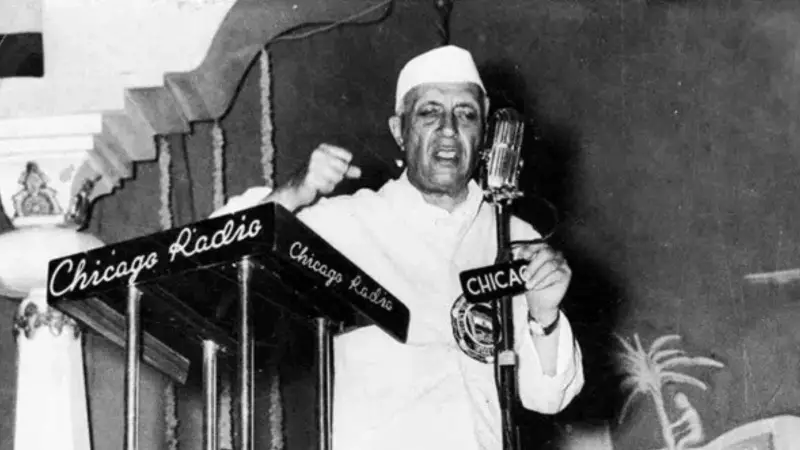
The recently launched digital Nehru Archive has unveiled a treasure trove of historical documents, including a revealing 1948 letter from Prime Minister Jawaharlal Nehru explaining why Vande Mataram was not chosen as India's national anthem. The comprehensive archive, comprising 77,000 pages and 35,000 documents, provides unprecedented access to Nehru's correspondence and speeches.
The National Anthem Decision
In a letter dated June 21, 1948, Nehru wrote to Syama Prasad Mookerjee, then a minister in his Cabinet, explaining the government's preference for Jana Gana Mana over Vande Mataram as the national anthem. The Prime Minister cited specific musical reasons for this decision, stating that Vande Mataram's tune "does not suit orchestral or band rendering."
Nehru elaborated that while Vande Mataram held deep emotional significance for the freedom struggle, Jana Gana Mana had already gained international appreciation. He wrote: "Jana Gana Mana, on the other hand, has already been greatly appreciated in foreign countries as well as in India and the music of it has a great appeal to people who hear it in India or abroad."
Emotional Attachment vs Practical Considerations
The first Prime Minister acknowledged the emotional connection Indians had with Vande Mataram, calling it "intimately connected with our entire national struggle." However, he made a crucial distinction between songs of struggle and songs of achievement.
"I personally think that a song which represents poignant longing for freedom is not necessarily a song which fits in with the achievement of freedom," Nehru wrote, adding that Jana Gana Mana carried "an element of triumph and fulfilment" more appropriate for an independent nation.
Nehru was responding to Mookerjee's suggestion that the government issue a press statement explaining the provisional decision to adopt Jana Gana Mana, given the strong feelings expressed in several quarters about the anthem selection.
Comprehensive Digital Archive Launched
The Nehru Archive represents a monumental effort to digitize and make accessible the complete works and correspondence of India's first Prime Minister. Launched to mark Nehru's 136th birth anniversary, the 100-volume archive is described as a "final authoritative and authenticated resource" on Nehru.
Historian Madhavan Palat, who serves as JNMF secretary and The Nehru Archive editor, emphasized the accessibility benefits: "This saves the labour of going to a library, locating the volumes required, and searching the indexes of the volumes. Each word is searchable in the archive."
The archive includes diverse materials covering:
- Nehru's correspondence with Indian and foreign leaders
- His views on the Sino-Indian border war
- Relations with the United States
- Various policy matters and speeches
Other Significant Revelations
The archive contains numerous other historically significant documents, including Nehru's emotional May 28, 1949 address to Indian soldiers regarding the Kashmir conflict. He declared: "Every nation has to pay the price of freedom by blood, sweat and tears. We have paid the price for our freedom in blood but now we have to build up the country with our sweat and tears."
Other notable documents include Nehru's 1950 birthday message to Sardar Vallabhbhai Patel, where he paid homage to his colleague's "long and notable record of service," and his 1963 correspondence about the Sino-Indian war, where he expressed shock at "this invasion by a country we have tried to be friendly with."
The archive also reveals Nehru's 1963 admonishment of Congress leader Kailas Nath Katju for attending an RSS camp, stating clearly that "no Congressman should associate himself with any function organised by these organisations."
Technical Implementation and Future Plans
The digital archive was created through meticulous work by researchers Jahanvi Sodha and Pranav Pandey, who studied history at Jawaharlal Nehru University. They worked for a year beginning November 14, 2024, creating metadata with approximately 30,000 tags attached to relevant speeches and documents.
Sodha explained the process: "The idea was to separate each letter, each note, each press conference of Nehru. So we copy-pasted each document separately. We created meta data with tags and then attached to the relevant speeches and documents."
According to historian Aditya Mukherjee, the archive serves as a crucial resource not just for academics but also for journalists and citizens seeking to verify claims about Nehru. "The venom in the social media needed to be at least challenged by providing genuine material. Let the public decide," he stated.
The current phase includes the Selected Works of Nehru, with plans to expand the archive to include photos, audio and video material, his books, and Hindi writings from all possible sources.





